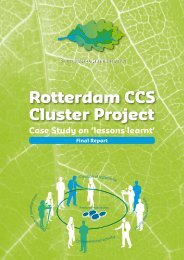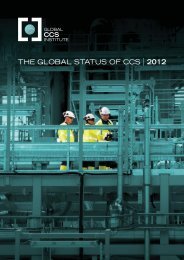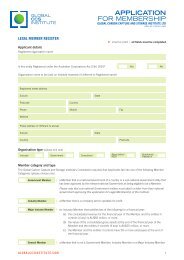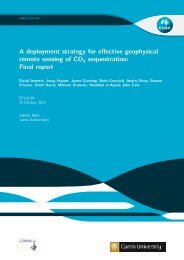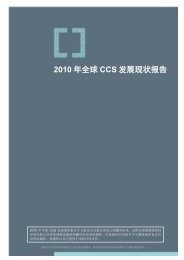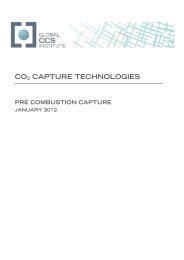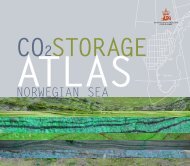Proceedings from CCS Cost Workshop - Global CCS Institute
Proceedings from CCS Cost Workshop - Global CCS Institute
Proceedings from CCS Cost Workshop - Global CCS Institute
Create successful ePaper yourself
Turn your PDF publications into a flip-book with our unique Google optimized e-Paper software.
PROCEEDINGS FROM <strong>CCS</strong> COST WORKSHOPBreakout Session 1B: CO 2 Capture <strong>Cost</strong>sSession Chair: Howard Herzog; Rapporteur: Matthias FinkenrathBreakout Session 1b focused on costs for CO 2 Capture. The breakout group discussed severalareas related to CO 2 capture cost estimation that could be of interest for future work:• Work towards developing a common terminology and framework for cost estimates, atleast for aggregated cost figures, using consistent boundary conditions• Develop a recommended methodology and improve understanding on specific issues,e.g. how to best escalate costs of previous studies.• Improve the understanding of regional differences in cost estimates in terms of coststructures across globe; gather additional cost data also for emerging countries.• From a site- and project-specific perspective, improve the understanding of thebreakdown of cost estimates and specific uncertainties (including e.g. cost ofpermitting).• Improve communication of cost estimates and their characteristics to policy makers,considering differences between costs for CO 2 capture in the near- and long-term, andbetween regions.In addition benefits of establishing a <strong>CCS</strong> cost network were discussed. It was concluded that anetwork between <strong>CCS</strong> cost experts would be useful for information exchange. Ideas for relatedactivities included addressing the lack of common terminologies and methodologies, improvegeneral understanding of costs and work towards best practices or guidelines, as outlined above.A network could help to collect and organise relevant studies and information, and tocommunicate the current status of <strong>CCS</strong> costs more clearly. Future activities could includeidentifying gaps in knowledge, peer review cost evaluations and relate costs to technologicaldevelopment status and challenges.A broad range of potential members was identified in the context of a <strong>CCS</strong> costs network, suchas the power, oil and gas industry, equipment manufacturers, academia, NGOs, engineeringcompanies, governments and other energy-intensive industries. Membership could be based onapplication process during which interested parties would need to describe what they could bringto the table as input to the network. Institutions such as the IEAGHG Implementing Agreementor <strong>Global</strong> <strong>CCS</strong> <strong>Institute</strong> were suggested to manage the network, guided by a steering committeeand supported by working groups on specific subjects.14




